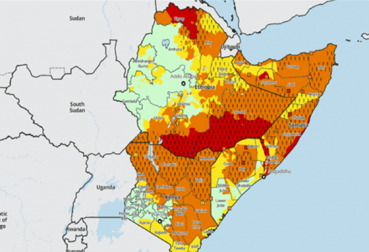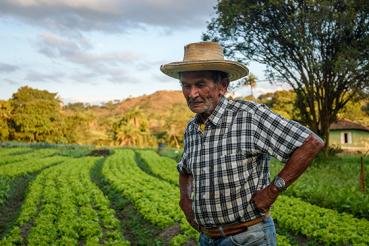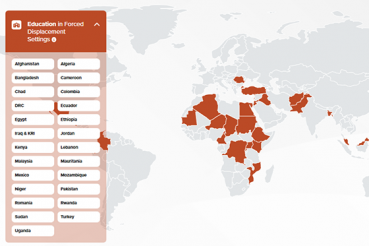Generating and Using Evidence to Build Climate Change Resilience
Climate-related disasters and extreme environmental conditions exacerbate existing societal vulnerabilities and disparities, leading to substantial social, economic, health, and food security challenges across the globe. Strengthening resiliency and addressing these inequities requires evidence-based solutions. Building equitable approaches to collecting data, generating evidence, and providing technical assistance locally, regionally, nationally, and globally are among the approaches AIR is leveraging to create more resilient communities and to address challenges related to climate change.
Watch our October 12, 2023 webinar, Addressing Socioeconomic Indicators of Climate Change Vulnerability.
 As a global community, we must address the causes of climate change and help those who are particularly vulnerable to its effects. At AIR, our deep and diverse expertise can be applied to mitigate the social, economic, and health effects of climate change and environmental disasters. We do this by generating evidence that can be used by global leaders to improve practices, build capacity, and address equity gaps.
As a global community, we must address the causes of climate change and help those who are particularly vulnerable to its effects. At AIR, our deep and diverse expertise can be applied to mitigate the social, economic, and health effects of climate change and environmental disasters. We do this by generating evidence that can be used by global leaders to improve practices, build capacity, and address equity gaps.
- Jessica Heppen, President, AIR
Creating Opportunities for All to Thrive
Our rapidly changing climate—and our collective understanding of how and why these changes affect humans—directly aligns with AIR’s broad body of work in pursuit of a better, more equitable world. Each of our teams, which focus on physical and mental health, education, workforce development, and international development, include experts who have experience generating evidence using rigorous research methods, and providing evidence-based technical assistance, to solve the world’s most urgent social challenges.
At AIR, our experts are committed to generating and using evidence that creates opportunities for all to thrive, including efforts to better understand the effects of climate change on already marginalized populations and generating evidence on programs that try to mitigate these negative effects. The following projects and event recordings demonstrate AIR's commitment to helping our partners build capacity to prepare for, respond to, and recover from climate-related threats.
Notable Projects and Valuable Insights

Meteorological and Agricultural Data Help Predict Acute Food Insecurity
AIR partners with the U.S. Agency for International Development to manage the Famine Early Warning Systems Network (FEWS NET) Learning and Data Hub.
FEWS NET provides evidence-based analysis to help governments and relief agencies plan for and respond to humanitarian crises, providing a data warehouse that collects data across multiple countries and a website that enables users to understand more effectively the analysis using interactive data visualization. Recent alerts about the Horn of Africa, for example, indicate that record-breaking drought, conflict, and high global food prices have left millions of people in need of emergency assistance. View the related blog post, Climate Change Brings Opportunities to Predict Droughts, Floods Earlier.

Agricultural Disruptions in Central America Worsened by Climate Change
People living in El Salvador, Guatemala, and Honduras face significant agricultural challenges due to climate change and extreme climate events. These challenges often exacerbate existing inequalities, force internal migration, and disrupt livelihoods. The Agricultural Trade and Climate Smart Innovations project aims to generate new evidence to address challenges related to agricultural trade and root causes of forced migration. Learn more about agricultural disruptions.
Image
Connection with the communities where we live and work has always been a part of AIR’s identity. Recognizing the intersection between climate change and thriving communities, AIR recently partnered with groups like Development in Gardening, which fosters climate resilience among marginalized people in rural Kenya through gardening, community mentorship, and entrepreneurship.
Makini Nyanteh
Senior Vice President and
Chief Communications Officer, AIR

Interactive Map: Initiatives for Refugees and Internally Displaced People
AIR is active in more than 90 countries, with a portfolio of projects that includes displaced populations and causes for displacement such as climate crises, nutrition and food insecurity, conflict, and more. Explore our interactive map to learn about our work with refugees and internally displaced people.

Exploring the Effects of Environmental Conditions on Equity and Student Achievement
Existing research indicates that many school sites face environmental and health problems that affect education outcomes. A project, started in 2023, explores the effects of environmental conditions on equity in student achievement. Our work includes evaluating the potential impact of classroom air purifiers on student achievement by mitigating student exposure to air pollution and pathogens. Learn more about the effects of the environment on students.

Developing Resources to Communicate Health-Related Risks
For organizations like the Agency for Toxic Substances and Disease Registry, AIR experts have developed toolkits, training videos, and other resources to help public health professionals communicate effectively about environmental health risks.
Image
Communities experiencing systemic inequities face greater barriers in adapting to extreme weather brought on by climate change. Extreme weather affects student learning, health outcomes, and even crime rates. The AIR Equity Initiative supports communities that are leveraging research and technical assistance to drive social change and create more equitable and climate-conscious systems that work for everyone.
Rashawn Ray
Vice President, AIR and
Executive Director of the AIR Equity Initiative

International Food Security Challenges Caused by Extreme Weather Emergencies
Addressing the effects of climate change on food security in low- and middle- income countries will become more urgent as extreme heat and other environmental disasters wreak havoc on families and communities whose livelihoods depend on the farming industry. AIR is evaluating a program in Tanzania that is designed to provide nutrition-focused education and training to combat food insecurity caused by climate change. Learn more about international food security challenges.
Events About Climate Resiliency
Evidence Synthesis for Climate Change
On June 6, 2023, AIR held a discussion on current practices for evidence synthesis and how these practices can be used to further climate change research.
Climate Change, Pollution, and Mental Health
On March 22, 2023, AIR experts hosted a discussion on how climate change and pollution impact mental health, with a focus on their work in India, Mexico, and Kenya.
Sign up for our newsletter and stay connected to the latest news, evidence, and resources from the American Institutes for Research®.
AIR's Institutional Commitment to Sustainability
Environmental stewardship is part of AIR’s corporate responsibility and institutional culture. Our Workplace Management Team collaborates with senior leadership, internal and external stakeholders, vendors, and experts to assess and measure our current sustainability efforts and develop and implement new strategies to ensure operational excellence and maximize our sustainability going forward.
To learn more about AIR’s commitment to mitigating the effects of climate change, please contact us.


